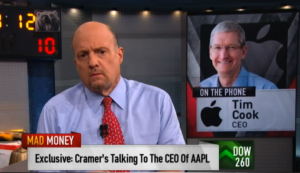 Tim Cook broke the law to help Apple, the Cupertino CEO by privately disclosing financial secrets to a third party before they were publicly announced, such actions being contrary to American law.
Tim Cook broke the law to help Apple, the Cupertino CEO by privately disclosing financial secrets to a third party before they were publicly announced, such actions being contrary to American law.
We are talking about an email sent yesterday by Tim Cook to the moderator of a CNBC financial show, the CEO of Apple telling him that his company has an unexpectedly good financial performance in China and that in the future he expects even better results.
Basically, Tim Cook gave that moderator an illegal advantage over other investors who did not know the same information about the Apple company, the email being sent at a time when the share price was falling and investors needed to be reassured.
Although those from CNBC finally published the complete email, Apple had to provide this information, or Tim Cook through a social media account or public blog, but the way he decided to share the information is not legal and American lawyers say that Tim Cook could be investigated by the authorities.
The SEC will undoubtedly want to take a look at this. At the very least, the SEC will contact Apple to seek context for the disclosure. It constitutes a disclosure giving certain individuals the benefit before it was percolated by the rest of the public, during a fast-moving, extraordinary market.
The American authority that oversees the transactions made on the US stock exchanges has not yet commented on the whole situation, but it is unlikely that they will not want to investigate the problem since so much attention has been created around it.
Because we are talking about Tim Cook and because Apple has a team of lawyers with a lot of experience behind it, it is hard to believe that the email was sent without knowing the consequences and without a defense plan behind it, so it will be interesting to see how things will evolve.
Before you think that this is just an unfortunate incident within Apple, you have to think that Steve Jobs acted similarly when he had to protect his company, and the most famous case is the one in which he and the presidents of other companies in Silicon Valley agreed illegally not to steal their employees.















